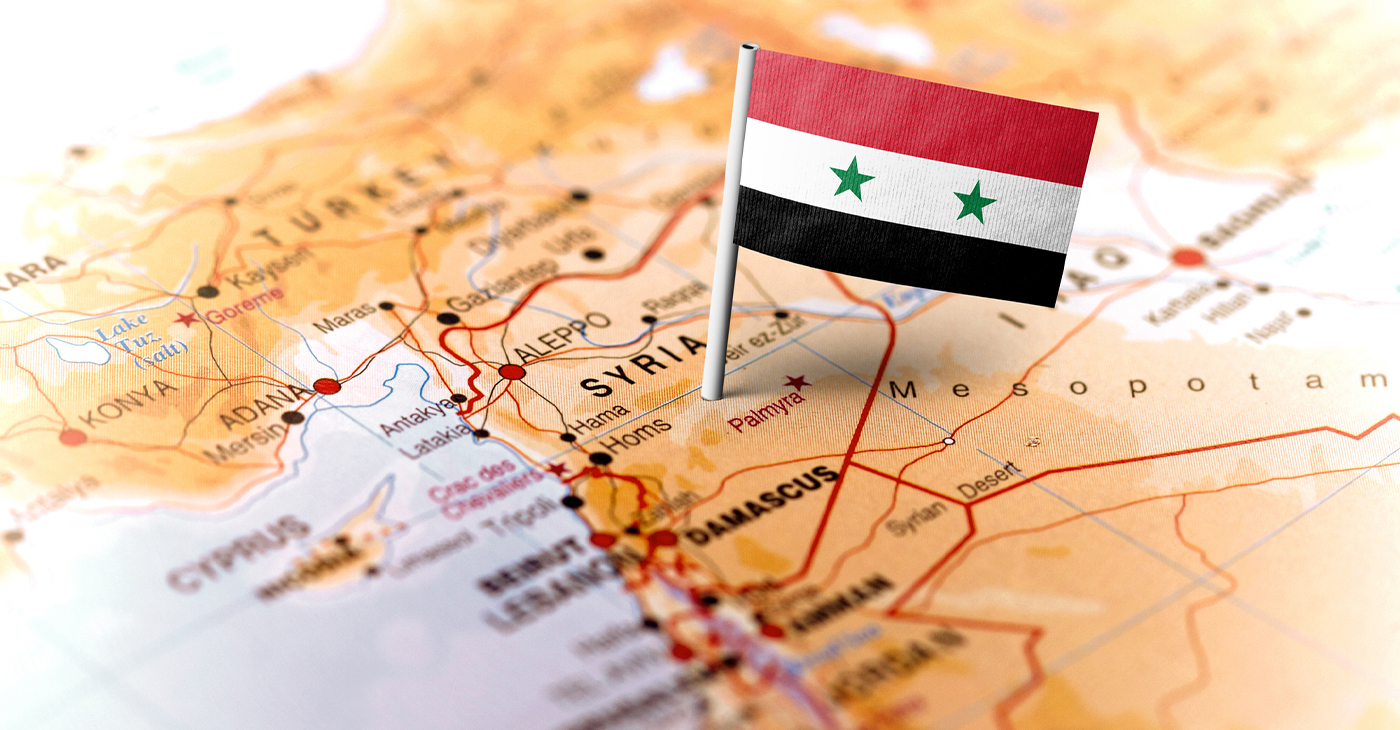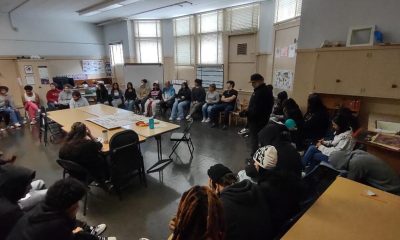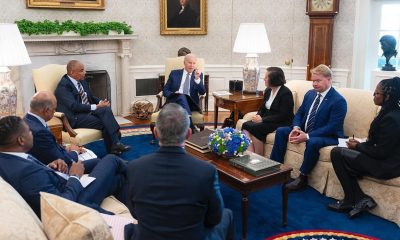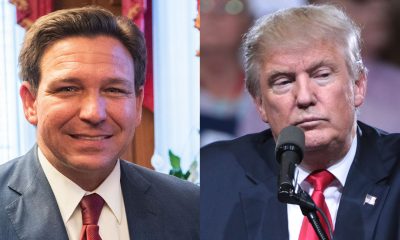World
Cubans to Open Talks About US Fugitives as Ties Warm

A man drives his taxi past a Cultural Center with the word “Cuba” on it, in Havana, Cuba, Tuesday, April 14, 2015. President Barack Obama will remove Cuba from the list of state sponsors of terrorism, the White House announced Tuesday, a key step in his bid to normalize relations between the two countries. (AP Photo/Desmond Boylan)
MICHAEL WEISSENSTEIN, Associated Press
MATTHEW LEE, Associated Press
HAVANA (AP) — The U.S. and Cuba will open talks about two of America’s most-wanted fugitives as part of a new dialogue about law-enforcement cooperation made possible by President Barack Obama’s decision to remove Cuba from a list of state sponsors of terror, the State Department announced Wednesday.
Cuban officials and ordinary citizens alike hailed Obama’s action to remove the island from the list, saying it heals a decades-old insult to national pride and clears the way to swiftly restore diplomatic relations.
State Department spokesman Jeff Rathke said Cuba had agreed to talks about fugitives including Joanne Chesimard, aka Assata Shakur, who was granted asylum by Fidel Castro after she escaped from a U.S. prison where she was serving a sentence for killing a New Jersey state trooper in 1973. The U.S. and Cuba will also discuss the case of William Morales, a Puerto Rican nationalist wanted in connection with bombings in New York in the 1970s.
“We see the reestablishment of diplomatic relations and the reopening of an embassy in Havana as the means by which we’ll be able, more effectively, to press the Cuban government on law enforcement issues such as fugitives. And Cuba has agreed to enter into a law enforcement dialogue with the United States that will work to resolve these cases,” Rathke said. The dialogue is also expected to address cooperation on more routine crimes, officials said.
A Cuban government spokesman did not immediately return calls seeking comment Wednesday, but Josefina Vidal, Cuba’s top diplomat for U.S. affairs, recently ruled out any return of political refugees.
Still she said Tuesday night that “the Cuban government recognizes the president of the United States’ just decision to take Cuba off a list in which it should never have been included.”
Cuban and U.S. foreign-policy experts said the two governments appeared to have taken a major leap toward the reopening of embassies in Havana and Washington after four months of complex and occasionally frustrating negotiations.
“This is important because it speaks to Obama’s desire to keep moving forward,” said Esteban Morales, a political science professor at the University of Havana. “Now there are no political obstacles. What remains are organizational and technical problems, which can be resolved.”
In a message to Congress, Obama said Tuesday that Cuba’s government “has not provided any support for international terrorism” over the last six months and has given “assurances that it will not support acts of international terrorism in the future.”
Cuba will officially be removed from the terrorism list 45 days after the president’s message was sent to Congress. Lawmakers could vote to block the move during that window, though Obama would be nearly certain to veto such a measure.
Rathke said Cuba had also provided assurances that Basque nationalists living in Cuba would never be allowed out to carry out future attacks against Spain.
What remains to be seen is whether Cuba will allow U.S. diplomats to move around Cuba and maintain contacts with citizens including dissidents, the second point of contention in the negotiations on restoring full diplomatic relations.
Cuba is highly sensitive to any indication the U.S. is supporting domestic dissent and that issue could prove considerably tougher than amending the terrorism list. The Obama administration made little pretense in recent years that it believed Cuba was still supporting terrorism.
Cuba was put on the list in 1982 because of what the U.S. said were its efforts “to promote armed revolution by organizations that used terrorism.” That included support for leftist guerrilla groups including the Revolutionary Armed Forces of Colombia and the Basque separatist movement ETA in Spain.
Cuba renounced direct support for militant groups years ago and is sponsoring peace talks between the FARC and Colombia’s government. Spain no longer appears to be actively seeking the return of inactive ETA members who may be in Cuba.
For Cubans, the terrorism list was a particularly charged issue because of the U.S. history of supporting exile groups responsible for attacks on the island, including the 1976 bombing of a Cuban passenger flight from Barbados that killed 73 people aboard. The attack was linked to Cuban exiles with ties to U.S.-backed anti-Castro groups, and both men accused of masterminding the crime took shelter in Florida, where one, Luis Posada Carriles, lives to this day.
“It’s really good that they finally took us off the list even though the reality is that we never should have been there,” said Rigoberto Morejon, a member of the Cuban national fencing team who lost three training partners in the bombing. He added that the hoped “we can keep advancing in the re-establishment of relations.”
Beyond the emotional impact, the terrorism list hobbled Cuba’s ability to do business internationally.
A 1996 law that strips sovereign immunity from nations on the list that engage in extrajudicial killings exposed Cuba to huge judgments in U.S. courts when mainly Cuban-American families accused the Cuban government of responsibility for the deaths of loved ones, said Robert Muse, a Washington-based lawyer who specializes in U.S. law on Cuba.
The perceived and real risks of doing business with a country on the list also made it highly difficult for Cuba to do business with foreign banks. The Cuban Interests Section in Washington has been forced to deal in cash since it lost its bank in the U.S. last year. The ability to reopen a U.S. bank account is one of Cuba’s most urgent demands in the negotiations to reopen embassies. While that decision falls to individual banks, removal from the list will make it easier.
The listing also prevented U.S. representatives at the World Bank and other global financial bodies from approving credit for Cuba, which is increasingly strapped for cash.
Obama’s decision was welcomed on the streets of Havana.
“Finally!” said Mercedes Delgado, a retired accountant. “The door’s opened a little more. That’s always good.”
___
Michael Weissenstein on Twitter: https://twitter.com/mweissenstein
___
Lee reported from Washington. Anne-Marie Garcia in Havana contributed to this report.
Copyright 2015 The Associated Press. All rights reserved. This material may not be published, broadcast, rewritten or redistributed.
Activism
Newsom, Pelosi Welcome Election of First American Pope; Call for Unity and Compassion
“In his first address, he reminded us that God loves each and every person,” said Newsom. “We trust that he will shepherd us through the best of the Church’s teachings: to respect human dignity, care for the poor, and wish for the common good of us all.” Newsom also expressed hope that the pontiff’s leadership would serve as a unifying force in a time of global instability.

By Bo Tefu, California Black Media
Gov. Gavin Newsom and First Partner Jennifer Siebel Newsom on May 8 issued a statement congratulating Pope Leo XIV on his historic election as the first American to lead the Catholic Church.
The announcement has drawn widespread reaction from U.S. leaders, including former House Speaker Nancy Pelosi, who called the moment spiritually significant and aligned with the values of service and social justice.
In their statement, the Newsoms expressed hope that the newly elected pope would guide the Church with a focus on compassion, dignity, and care for the most vulnerable. Newsom said he and the First Partner joined others around the world in celebrating the milestone and were encouraged by the pope’s first message.
“In his first address, he reminded us that God loves each and every person,” said Newsom. “We trust that he will shepherd us through the best of the Church’s teachings: to respect human dignity, care for the poor, and wish for the common good of us all.”
Newsom also expressed hope that the pontiff’s leadership would serve as a unifying force in a time of global instability.
“May he remind us that our better angels are not far away — they’re always within us, waiting to be heard,” he said.
Pelosi, a devout Catholic, also welcomed the pope’s election and noted his symbolic connection to earlier church leaders who championed workers’ rights and social equality.
“It is heartening that His Holiness continued the blessing that Pope Francis gave on Easter Sunday: ‘God loves everyone. Evil will not prevail,’” said Pelosi.
Activism
Retired Bay Area Journalist Finds Success in Paris with Black History Tours
In the late 90s, Stevenson finally realized her dream of living in Paris, now with her daughter. She started exploring the history of Africans in the city and would go on to teach others the same. Her business, which she named Black Paris Tours (BPT), received a significant boost when a family friend gave her a stack of cash and encouraged her to expand on the knowledge that she had only started to share with people she knew.

By Post Staff
There were two things Oakland-born, East Palo Alto-raised Ricki Stevenson always dreamed of:
- Going to New York as a newscaster to tell the true story of Blacks in America.
- Living and working in Paris one day.
Her dreams of life in Paris began when she was three years old and her mother, a former professional dancer, took her to see Josephine Baker perform. She was 11 when her parents took her to the Stanford University campus to meet James Baldwin, who was speaking about his book, “The Fire Next Time.” Ricki says that’s when she knew she’d one day live in Paris, “the city of light!”
But before that would ever happen, she had a tumultuous career as a newscaster across the country that was inspired by her family’s history.
Stevenson recalls marching with Cesar Chavez as he fought for labor rights for farm workers in California.
“Are we Mexican too?” she asked her parents. “No, but we will fight for everyone’s human rights,” they responded to her.
Ironically, Ricki’s paternal family roots went back to Greenwood, Oklahoma, infamous for the 1921 bombing of Black Wall Street. A time when Black people had oil wells, banks, and a thriving business community.
This background would propel her into a 25-year journalism career that gave her the opportunity to interview greats like President Jimmy Carter, PLO leader Yassir Arafat, James Baldwin, Rev. Jesse Jackson, UN Ambassador Andrew Young, Miriam Makeba, and the leaders of South African liberation movements.
A job offer from KCBS radio brought her back to the Bay Area in the 1980s. Then came the switch to TV when she was hired as a Silicon Valley business reporter with KSTS TV, working at the first Black-owned television station in northern CA (created and owned by John Douglas). Along the way, Stevenson worked as an entertainment reporter with BET; coproduced, with her disc jockey brother Isaac, a Bay Area show called “Magic Number Video;” lived in Saudi Arabia; worked as an international travel reporter with News Travel Network; and worked at KRON TV a news anchor and talk show host.
In 1997, Stevenson realized her dream of living in Paris with her young daughter, Dedie. She started exploring the history of Africans in the city and would go on to teach others the same. Her business, which she named Black Paris Tours (BPT), received a significant boost when a family friend, Admiral Robert Toney put a chunk of money in her hand. He said, “Ricki, my wife and I have been coming to Paris for 20 years, but in just two days with you and Dedie, we’ve learned and seen more than we ever did before.”
Years after BPT took off, Ricki met Nawo Carol Crawford and Miguel Overton Guerra, who she recruited as senior scholar guides for Black Paris Tours.
Guerra says he is proud of his work with Black Paris Tours in that it provides a wealth of information about the rich legacy of African and African American history and influence in Paris and Europe.
“I tend to have a feeling for history always being a means of a reference point backwards … you start to understand the history, that it isn’t just the United States, that it began with African people,” Guerra says.
He said that it’s been a pleasure to watch people learn something they didn’t know before and to take them through the city to key points in Black history, like hangout spots for writers like Baldwin and Richard Wright, restaurants in the busiest parts of Paris, the home of Josephine Baker and so much more.
Although the tours are open to all, Guerra hopes that those of African descent from all over the world can embrace that they don’t have to just stay where they are because movies and media have portrayed cities like Paris to be only white, it’s multicultural and accepting to all.
“We’ve been here, and we’ve been there, going way back when. And we shouldn’t be considered or consider ourselves to be strangers in any place that we go to,” he said.
Stevenson notes they’ve had 150,000 people take their tour over the years, with notables like former NFL quarterback Colin Kaepernick, Smokey Robinson, Steve Harvey, Miriam Makeba, and more.
Friends and former media colleagues of Stevenson compliment the BPT crew on their knowledge of the city and their ability to always keep it interesting.
“He [Guerra] just had a deep, deep wealth of knowledge and he was constantly supplanting information with historical facts and the like. I love that it was demonstrating and showing how Black people have thrived in Paris or contributed to the culture in Paris,” Candice Francis said.
She toured in the summer of 2022 and stated that in the two weeks that they visited Paris, BPT was the highlight of her trip. She shared that she was proud of Stevenson and the life she’d managed to manifest and build for herself.
“Even if you’re visiting Paris for the tenth time, if you haven’t taken the tour, then by all means, take it,” Francis emphasized.
Magaly Muñoz, Gay Plair and Paul Cobb also contributed to this story. You can book your own adventure with Black Paris Tours at www.blackparistour.com.
Activism
COMMENTARY: Will a Dictator’s Loss Change Trump’s Tune?
What’s happened in Syria has the potential of reshaping the politics of the entire Middle East. The U.S. can’t afford to sit back and do nothing. Now is the time to exert peaceful, diplomatic influence on how Syria maintains stability and goes forward with a new democracy.

By Emil Guillermo
In our polarized country, half of America can’t wait, while many of us still wonder, “where’s Kamala?”
I hope President-elect Trump — who famously said during the campaign that he’d be a dictator on day one — eats his words.
Dictators aren’t doing so well these days.
Last weekend, the dictator Bashar al-Assad was run out of Syria and sought exile with his puppet master/dictator Vladimir Putin of Russia. In just about two weeks, a coalition of rebels applied enough pressure to end a family regime in Syria that lasted 50 years.
al-Assad’s wealthy family dictatorship plundered Syria and ruled in terror.
It sounds all too familiar to Filipino Americans, many of whom came to the U.S. fleeing the Philippine dictator Ferdinand Marcos.
al-Assad’s end was different from the Filipinos who forged a peaceful People Power movement that chased the Marcos family to Hawaii where they sought refuge from their U.S. puppet handlers.
But as in Manila, there was cheering on the streets of Syria. Men, women, and children. Christian, Muslims, different sects and ethnicities, all united against al-Assad.
al-Assad has been described as a genocidal narco-trafficking tyrant, whose friends were America’s biggest enemies, Iran, Hezbollah, and Russia, said Mouaz Moustafa, the executive director of the Syrian Emergency Task Force, on CNN.
Moustafa said it was amazing that there would be no more Russian airstrikes, no more al-Assad gulags torturing civilians. “To see good triumph over evil is an amazing thing,” he added.
But last weekend has some trickle down.
Consider that we are talking about al-Assad, the one Tulsi Gabbard consorted with and hyped to her colleagues when she was in Congress. Now Assad has been shamed into exile with his puppet master Russia, and Gabbard wants to be the U.S. director of national security? Given her wrongheaded judgment on al-Assad, can she be trusted with any national secrets?
It’s still not over in Syria, as now there will be a scramble to see what kind of governing democracy emerges.
Predictably, Donald Trump has said, “The United States should have nothing to do with it. This is not our fight. Let it play out. Do not get involved.”
Nouveau isolationism?
What’s happened in Syria has the potential of reshaping the politics of the entire Middle East. The U.S. can’t afford to sit back and do nothing. Now is the time to exert peaceful, diplomatic influence on how Syria maintains stability and goes forward with a new democracy.
Overall, the ouster of the dictator should give Trump pause.
If by nominating MAGA loyalists like Gabbard, Pete Hegseth and Kash Patel, Trump’s testing the evolution to strongman rule in the U.S., he should consider what happened before last weekend.
In South Korea, a weak president tried to declare martial law and was voted down by Parliament. That’s a faux strongman.
Let’s hope Trump learns a lesson from the week’s news.
The next president sets the tone for a politics that’s already toxic.
He needs to remember the joy in Syria this week when an autocrat was dumped in the name of freedom and democracy.
About the Author
Emil Guillermo is an award-winning Bay Area journalist. His commentaries are on YouTube.com/@emilamok1. Or join him at www.patreon.com/emilamok
-

 Activism4 weeks ago
Activism4 weeks agoAI Is Reshaping Black Healthcare: Promise, Peril, and the Push for Improved Results in California
-

 Activism4 weeks ago
Activism4 weeks agoBarbara Lee Accepts Victory With “Responsibility, Humility and Love”
-

 Activism4 weeks ago
Activism4 weeks agoESSAY: Technology and Medicine, a Primary Care Point of View
-

 Activism4 weeks ago
Activism4 weeks agoNewsom Fights Back as AmeriCorps Shutdown Threatens Vital Services in Black Communities
-

 Activism4 weeks ago
Activism4 weeks agoFaces Around the Bay: Author Karen Lewis Took the ‘Detour to Straight Street’
-

 Arts and Culture4 weeks ago
Arts and Culture4 weeks agoBOOK REVIEW: Love, Rita: An American Story of Sisterhood, Joy, Loss, and Legacy
-

 #NNPA BlackPress4 weeks ago
#NNPA BlackPress4 weeks agoThe RESISTANCE – FREEDOM NOW
-

 Alameda County4 weeks ago
Alameda County4 weeks agoOUSD Supt. Chief Kyla Johnson-Trammell to Step Down on July 1


















































